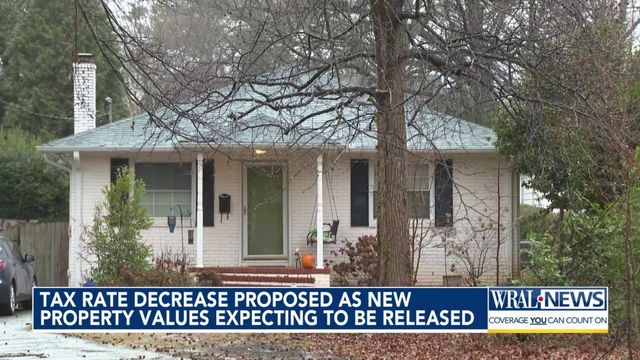How to appeal the assessed property value of your Wake County home
Wake County homeowners should have received notices last week in the mail with information on the new assessed value of their properties as of the new year.
The county provides the notices as part of its revaluation process, which is conducted every four years.
While North Carolina law requires counties to hold a revaluation every eight years, the Wake County Board of Commissioners voted in 2016 to shorten the county’s revaluation cycle to every four years.
The revaluation is part of the county’s process to determine how much money homeowners will pay in property taxes.
In the coming months, the Wake County Board of Commissioners and the Raleigh City Council will set a new tax rate that is expected to generate about $1.4 billion in property tax for fiscal year 2025 (July 1, 2024 - June 30, 2025) from an approximate tax base of $301 billion. The rate is called a revenue neutral tax rate, and it is still being calculated.
Wake County leaders are proposing a rate of $0.4643 per $100 of value. It’s a decrease from Wake County’s $.6570 per $100 of value in 2023. The county can raise the same amount of money with a lower tax rate because the total property values are higher.
If the revenue neutral tax rate stays at $0.4643 per $100 of value, here’s what it means for your property tax bills. Ultimately, who pays more depends where you live.
- Homeowners in in Apex, Cary, Fuquay-Varina, Garner, Morrisville and Wendell are expected to pay more.
- Homeowners in Holly Springs will likely see their property taxes stay flat.
- Homeowners in Knightdale, Raleigh, Rolesville, Wake Forest, Zebulon and unincorporated areas could see a decrease.
Property owners will need to compare the percentage change of their property value to the average percentage change for Wake County overall. If county leaders adopt the proposed revenue neutral tax rate, there are three possibilities for how the new property values impact taxes:
- If your individual property’s value change was lower than the overall average change for property in Wake County: your taxes will likely go down.
- If your individual property’s value change was about the same as the overall average change for the county: your taxes will likely stay the same.
- If your individual property’s value change was higher than the overall average change in the county: your taxes will likely go up.
Property value percentage change by Wake County municipality:
Wake County overall
- Residential change: 53%
- Commercial change: 43%
- Overall change: 51%
Apex
- Residential change: 57%
- Commercial change: 53%
- Overall change: 56%
Cary
- Residential change: 56%
- Commercial change: 39%
- Overall change: 51%
Fuquay-Varina
- Residential change: 54%
- Commercial change: 52%
- Overall change: 54%
Garner
- Residential change: 54%
- Commercial change: 59%
- Overall change: 56%
Holly Springs
- Residential change: 53%
- Commercial change: 80%
- Overall change: 58%
Knightdale
- Residential change: 51%
- Commercial change: 67%
- Overall change: 57%
Morrisville
- Residential change: 55%
- Commercial change: 37%
- Overall change: 45%
Raleigh
- Residential change: 52%
- Commercial change: 43%
- Overall change: 48%
Rolesville
- Residential change: 51%
- Commercial change: 52%
- Overall change: 51%
Wake Forest
- Residential change: 51%
- Commercial change: 50%
- Overall change: 51%
Wendell
- Residential change: 63%
- Commercial change: 75%
- Overall change: 65%
Zebulon
- Residential change: 48%
- Commercial change: 50%
- Overall change: 49%
Unincorporated
- Residential change: 52%
- Commercial change: 41%
- Overall change: 51%
Local leaders are expected to vote on the new property tax rate in June before the start of the fiscal year on July 1.
Why would someone appeal their property tax value?
An overvaluation can lead to an inflated tax bill, making a homeowner pay more than necessary.
Anyone who believes their property has been inaccurately assessed can appeal. A successful appeal can yield a lower property value and lower taxes.
Wake County Tax Administrator Marcus Kinrade told WRAL News that he expects about 30,000appeals (about 5 to 7% of property owners) among the 403,886 residential properties and 23,641 commercial properties assessed.
How to file an informal appeal of your property tax in Wake County
Requests to file an informal appeal started on Jan. 16.
March 1 is the deadline to file an informal appeal. The county’s tax administration office will notify taxpayers of results by mid-April 2024.
Property owners wanting to file an informal appeal can fill out an online form, call 919-856-5400 or send a written request to:
Wake County Tax Administration
Attention: 2024 Real Estate Revaluation
P.O. Box 2331
Raleigh NC 27602
Property owners will need to provide their real estate ID and access code whether they’re filing a formal or informal appeal. The information is provided in the written notice from Wake County.
In an informal appeal, the tax administration office performs the review and decides the result. In a formal appeal, the result is decided by the Board of Equalization and Review (BOER) at a hearing.
The county’s website states the informal appeal process often involves providing tax administrators clarification regarding property characteristics, a recent appraisal supporting an opinion of market value or any other information in support of the taxpayer’s opinion of value.
The request will be reviewed by a tax office appraiser, who may contact the property owner if they have questions.
Once the appraiser has reviewed the information, they will decide whether a change in assessed value is supported.
In either case, the person filing the appeal (and owner, if different) will be sent a letter with the outcome. The letter will include the new assessed value if applicable.
If the taxpayer agrees, no additional steps are needed. If the taxpayer wants to further appeal, they can submit a formal appeal to the BOER.
How to file a formal appeal of your property tax in Wake County
Taxpayers may choose not to submit an informal review and instead appeal directly to the BOER.
Requests for a formal appeal must be submitted between March 2 and May 15.
Unlike an informal review performed by an appraiser in the Tax Administration office who also decides the result, the result of a BOER appeal is decided by the board at a hearing. The BOER considers both information submitted by the property owner and the opinion of the county appraiser when making a decision.
BOER hearings will be held at the Wake County Commons Building, located at 4011 Carya Drive in Raleigh. There is no charge for parking.
Taxpayers will be notified of the date and time of their hearing via a letter mailed to the mailing address on file with Tax Administration. Taxpayers are not required to make a personal appearance at the hearing.
The BOER is scheduled to convene on April 24, according to county documentation.
According to the county, the BOER continues to meet through the fall until all appeals are heard.
Still have questions about Wake County property taxes?
Wake County’s revaluation call center is available at 919-857-3800 or email at revaluationrevaluation@wake.gov. There is also a website.
People can email general questions to taxhelp@wake.gov or by calling 919-856-5400.
Wake County’s Tax Administration Office is located on the third floor of the Wake County Justice Center in downtown Raleigh.
WRAL Data Trackers, delivered to your inbox
Subscribe to the WRAL Data Trackers: Raleigh email newsletter for specific, data-driven updates in what's going on in your Raleigh neighborhood.
Choose one or more of Raleigh's 18 neighborhoods and get a weekly, hyper-local update on the data that drives your quality of life, from crime stats to real estate sales to construction or traffic. Compare trends over time or see how your neighborhood compares to the city at large.
Choose your neighborhood and subscribe: https://www.wral.com/datatrackers/











